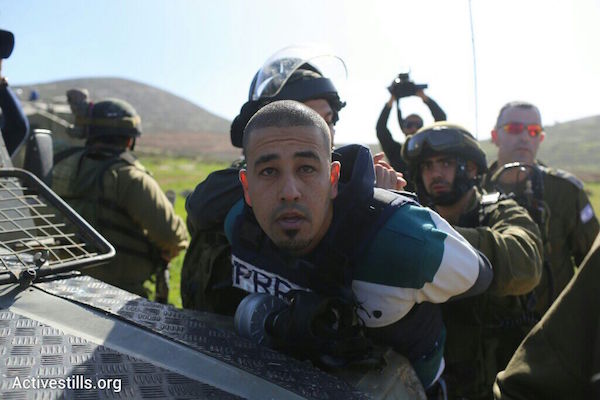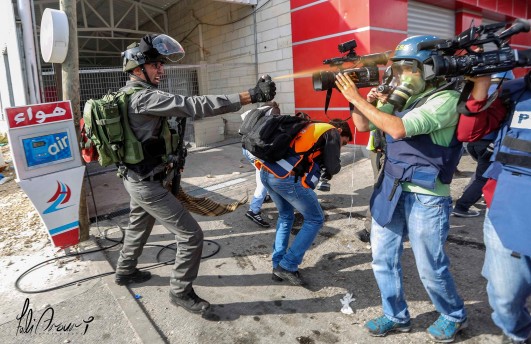Freedom House has downgraded its ranking of Israel’s media from ‘free’ to ‘partly free,’ citing closer ties to the government and a spike in paid media content. But it has one flagrant omission: Israel’s poor treatment of Palestinian journalists.
By Lisa Goldman

Freedom House, the U.S.-based watchdog NGO that reports on the state of civil liberties around the world, has downgraded its ranking of Israel’s media from “free” to “partly free” in its 2016 Freedom of the Press Report. The authors of the report cite the influence of the free daily newspaper Israel Hayom, which is owned and subsidized at a huge loss by American casino billionaire Sheldon Adelson, who is an unabashed patron of Prime Minister Benjamin Netanyahu. Israel Hayom pursues an editorial agenda that is overtly partisan toward Netanyahu, which is why it is often referred to as the “Bibiton,” a portmanteau of the Hebrew word for “newspaper” and the Israeli leader’s nickname, Bibi. The report also cites the “unchecked expansion” of paid media content, which is not always clearly identified. It notes that this paid content is sometimes funded by the government.
In 2014 Israel’s media was back up to “free” status, along with the perennial note that it has the freest media in the region, where not one country’s media is ranked “free.”
The free/partly free ranking is a matter of just a few points in their methodology, pointed out Freedom House’s Sarah Repucci, who heads up the publication of the annual Freedom of the Press Report. She added, “We use detailed methodology. Israel shifted only two points this year.”
There was some outrage in right-wing circles over the downgrade, with Washington Post columnist Jennifer Rubin quoting a couple of DC-based neo-cons to support her claim that the report was an example of anti-Israel bias.
Leaving aside the all-but inevitable expressions of outrage from the Israel advocacy crowd over any criticism of Israeli policy or society, a more detached observer might note that there is no mention in the Freedom House report of Palestinian journalists. On the one hand this makes sense, since Palestinian residents of the occupied territories are not citizens of Israel. But on the other hand, Palestinian journalists work in territory that is controlled by Israel. And they do not have any of the legal protections afforded to their Israeli colleagues working in the same territory.
In tangible terms, this means that Palestinian journalists going about their jobs reporting in the field are regularly subjected to verbal harassment, physical assault and arrest without charge at the hands of Israeli soldiers. In these cases, they can technically file a complaint — but there has never been a case of an Israeli soldier seriously censured for assaulting a Palestinian journalist.
Nor has there been any serious diplomatic blowback for Israel having arrested and detained without charge Palestinian journalists for months on end. Mohammed al-Qiq is a particularly egregious recent example. The 33-year-old Ramallah-based journalist recently ended a 94-day hunger strike to protest his having been arrested and detained indefinitely without charge under the laws of administrative detention. Also, the Palestinian Authority recently stated that there are currently 19 Palestinian journalists in Israeli custody.
A more quotidian incident of assault and/or harassment of Palestinian journalists at the hands of the Israeli military includes an October 2015 incident, recorded on video, that shows an officer in the Border Police casually walking over to a group of cameramen recording a West Bank demonstration and spraying them directly in the face with pepper spray. A medic who tried to treat the pepper spray victims was also assaulted and so overcome that he himself had to be hospitalized.

Incidents of these type occur quite regularly. In September 2015, soldiers assaulted two AFP reporters, including one Palestinian, who were covering a demonstration in a West Bank village. There are many videos on YouTube that show Israeli soldiers harassing Palestinian journalists for various media outlets, including female journalists, as they do live standups. In these cases there is absolutely nothing the victimized journalist can do. Complaining to the soldiers will almost certainly result in physical violence or arrest, with the soldiers accusing the Palestinian of instigating the assault. And if these cases do go to court they are tried in Israeli military court, where Palestinians are convicted at a rate of over 99 percent.
Israeli soldiers also frequently raid and shut down Palestinian media outlets, including the 2012 shut down of a Palestinian-Israeli initiative called Voice of Peace. And there have been many more recent incidents. In November 2015, security forces raided and shut down a Ramallah radio station called Al Hurria. And in March 2016 another Ramallah-based radio station, Palestine Today, was raided and shut down on orders of the Shin Bet, Israel’s domestic security service. Ramallah is, of course, in Area A — which is, according to the now all-but-fictional Oslo Accords, under the sovereignty of the Palestinian Authority.
Looking at these incidents in the aggregate, one could argue that Freedom House actually pulled its punches in its report about the Israeli media. Because while it is true that journalists who are citizens of Israel do have legal protections when they’re dealing with soldiers in the field, Palestinian journalists do not. They are without rights or legal recourse. And while they are not citizens, they are indisputably under Israeli control.


